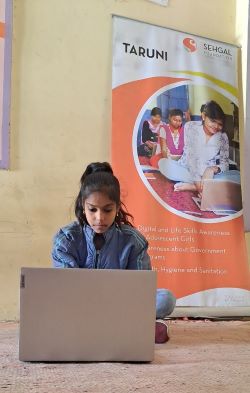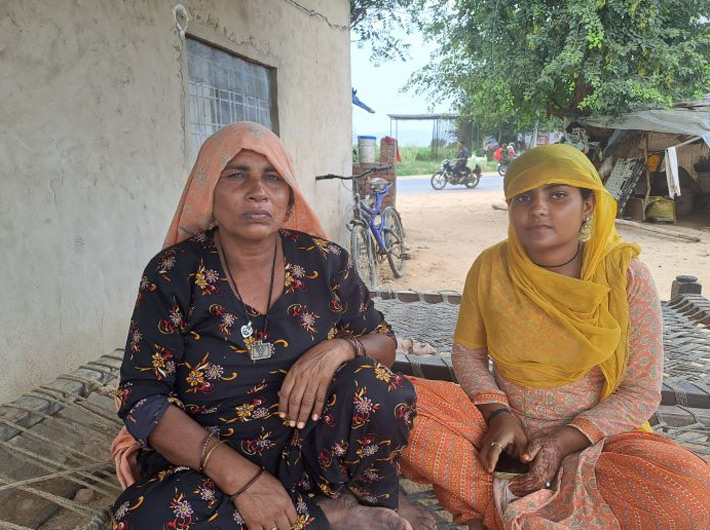Technologically empowered girls paving the way for an informed, information-led society
In the adjoining districts of Alwar, Rajasthan, and Nuh in Haryana, rural girls have leveraged digital awareness to access government programs related to health, education, public distribution system, and more. They have also used these skills for educational purposes, such as research, downloading exam IDs, and checking their results. Additionally, some students have applied their knowledge to create invitation cards and assist their families with mobile phone recharges, online shopping, and money transfers.
The development of an informed, information-led society significantly drives socioeconomic progress. Small successes achieved by students in villages, such as Devla Nangli, Mahua Khurd, Sangail, Jethana and Indragarh, have initiated positive changes in these communities, leading girls to increase their digital footprint.
Afsina, a student of class 11 at the Government Higher Secondary School in Mahua Khurd, Alwar, serves as an example of the impact of digital knowledge. She helped her family access a health benefit under a government program that they were previously unaware of. Through her timely intervention and registration with the Janaadhar card (of Janaadhar Yojana of the government of Rajasthan), her grandmother received free treatment under the state-run Chief Minister Chiranjeevi Scheme, covering medical costs for the families of small farmers and contractual labors registered under the Food Security Act. This averted a substantial expense, which her family could not have otherwise afforded.
 Class 9 student Shanu Gautam’s digital awareness saved her family from becoming a victim of online fraud. Shanu (in pic, left), a resident of village Bas Putli in Indragarh, Alwar, says, “If we had not learned about cyber security in our Digital and Life Skills Awareness class, perhaps I would have become a victim of the fraud of a car jackpot won by us, and we would have lost money. Money is earned with a lot of hard work.”
Class 9 student Shanu Gautam’s digital awareness saved her family from becoming a victim of online fraud. Shanu (in pic, left), a resident of village Bas Putli in Indragarh, Alwar, says, “If we had not learned about cyber security in our Digital and Life Skills Awareness class, perhaps I would have become a victim of the fraud of a car jackpot won by us, and we would have lost money. Money is earned with a lot of hard work.”
These girls exemplify the “Taruni” initiative being conducted across several states under the Transform Lives One School at a Time program of the S M Sehgal Foundation is bridging the digital divide in rural areas.
Through village-level centres, the initiative is providing digital awareness and life skills education, empowering girls to lead. Digital technology enhances education, reduces unemployment, and promotes socioeconomic development; but for youth, especially girls, to benefit from these opportunities, they need to be equipped with technological skills and access to digital devices.
As we move closer to 2030, the importance of acquiring digital skills has become critical. These essential skills encompass a range of abilities, such as internet searching, online communication through emails or instant messaging, use of online platforms, and understanding digital financial services. According to UNESCO (2020), only 40 percent of primary schools and 66 percent of secondary schools worldwide have internet access.
To engage meaningfully in society, girls must be equipped with the skills and opportunities to advance their vision of a connected future.
Ankit is Assistant Program Lead, Transform Lives One School At A Time, and Arti is Senior Manager, Public Relations with S M Sehgal Foundation.
